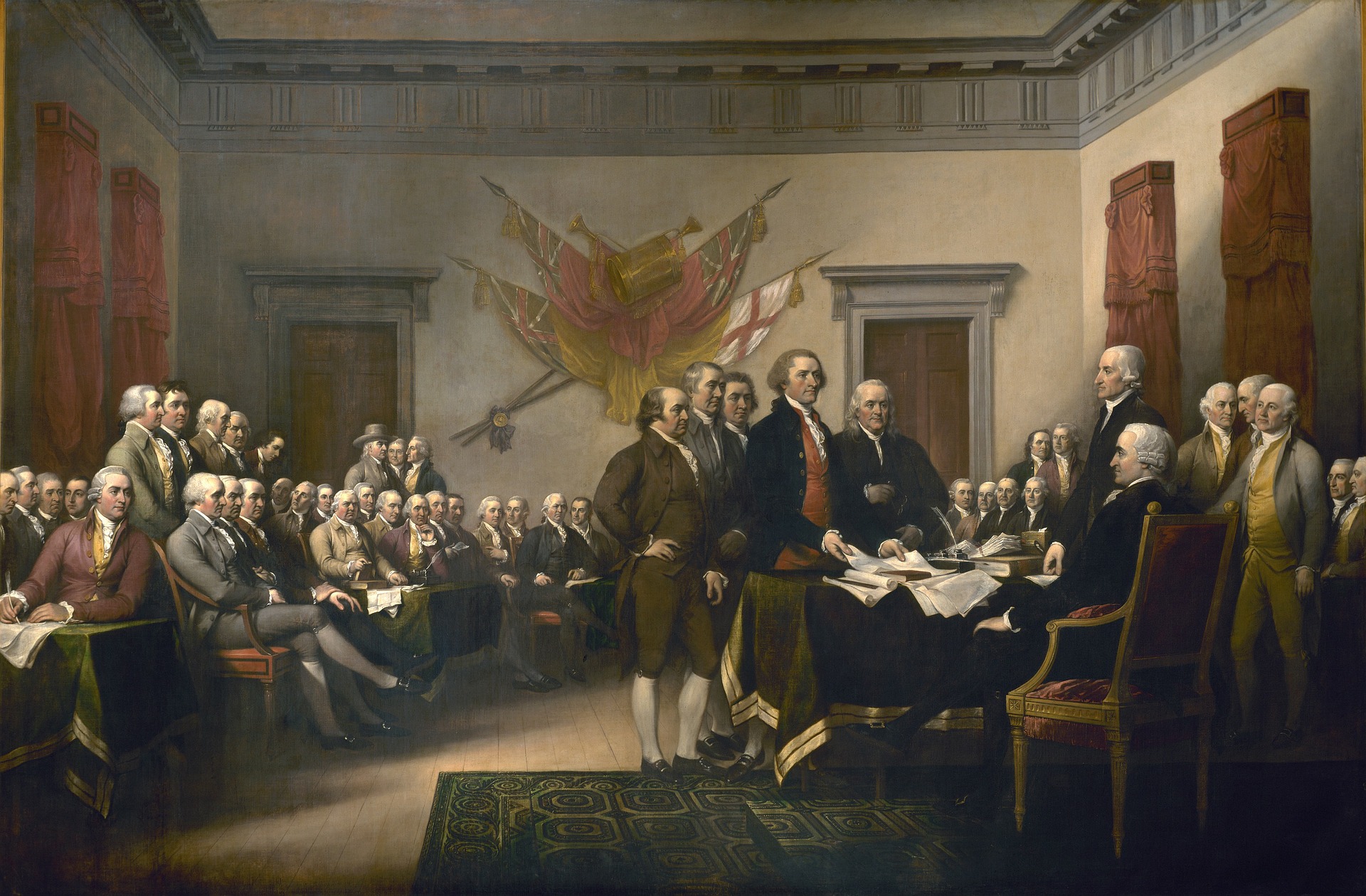
“We hold these truths to be self-evident, that all men are created equal, that they are endowed by their Creator with certain unalienable rights, that among these are Life, Liberty, and the Pursuit of Happiness.”
Thomas Jefferson (somewhat modified by committee) penned those words in 1776 at the behest of the Continental Congress and perhaps more particularly, of John Adams. Those words now live immortally in the hearts and souls of all people who recognize the universal application of such principles.
And while Jefferson’s words, promising life, liberty and the right to pursue happiness still ring true to us today, they may have meant something specific to Jefferson and to his generation not entirely in tune with how we think of such things today. Certainly, the principles so beautifully penned were not perfectly applied.
But immortal words become immortal, in part, because they continue to speak to us long after the circumstances within which they were first written have changed.
Here’s what they mean to me today. I present them in the form of a series of propositions organized under Jefferson’s 3 specified self-evident truths: Life, Liberty, and the Pursuit of Happiness.
Life
1. My life is mine. It does not belong to a nation or a ruler or a culture or even a family or a class or a race or a gender. It is mine. It belongs to me. So ultimately, what I do with it or choose not to do with it is my responsibility. My life is the result of the accumulation of the millions and millions of little daily decisions I make, including those I choose not to make. My happiness in life is therefore only mine to pursue. No one else is responsible for making me happy.
2. I believe Jefferson’s Creator gave life to me. If, then, my life belongs to anyone other than me, it also belongs to Him. And because life is granted to us by a Creator who considers it a fundamental right that cannot be alienated from us, my life is therefore sacred and holy and spiritual in nature.
3. I believe Life makes demands upon me. I have responsibility to become the best that I can be. I can grow and improve and change and adapt and increase and develop and become something I am not yet. Life provides me with that opportunity. It not only allows such improvements, it is one of the basic components of life. It is expected. It is hoped for. It is fundamental to the life experience.
4. This life is temporary. It is finite. There is a beginning and an end. What I do with myself between those ends defines in large measure who I am. I am what I do. Maybe better said, what I do consistently, over time, is who I become. Therefore, in the long run, again, I am what I do. My beliefs and intentions matter. My potential matters too. But truly what beats in my soul is what is demonstrated in my life. If you can’t see it, it can’t be a very strong beat. This temporary life is meant to prepare us for an eternal one. So how we use this life is filled with significance.
5. I believe my life matters, as does yours. I believe that with every fiber of my being. We have immense potential, perhaps beyond our ability to comprehend. We sell ourselves short when we think otherwise. I do not believe anyone was destined to a life of shear agony. Agony might be experienced in parts of our life, but much of it is often (not always!) self-induced. How we live and deal with our challenges will determine the quality of life now, the meaning and significance of our lives, the impact we have on others, and will set the stage for the next life.
Liberty
1. Liberty is a precondition to happiness. Without it, choices are not free. Paths are not chosen. Growth is stunted. Purpose is limited. Happiness is truncated.
2. I am free to choose either positive or negative. My choices in life may be moral or immoral, good or bad, appropriate or inappropriate, decent or indecent. However you choose to word the nature of our choices, in the end, I have the freedom to exercise my will as long as it does not infringe on others’. I am responsible for the outcome of my life. If it is happy or if it is sad, I created or used my liberty, my free agency, to grow or not to grow, to overcome or to wallow in my misery.
3. I believe liberty is the foundation of independence, which is the foundation of individuality. I believe we are happiest when our individuality is expressed through how we live, rather than what we wear or how we style our hair. My personality and character are of my own creation. I am free to develop them or accept the trajectory my family or circumstances or nature or culture set for me. But it is my choice. I choose to allow a preset trajectory for my life or I set one of my own liking.
The Pursuit of Happiness
1. We do not have a right to happiness. I am free to pursue it. But I have no right to demand it from others or expect my government to give it to me. For that matter, I don’t believe anyone has the capability to make me happy in the first place. All government can do is clear the path and provide me with the liberty to pursue that unalienable right.
2. I believe our path of happiness must include some pain. I believe we were given life so we can learn certain lessons and grow in certain ways that only a life somewhat divorced from God can produce. So pain and misery, sorrow and suffering, challenge and trial are woven into the fabric of life as a way to experience a depth of self-discovery only sorrow can provide. Pain teaches. It instructs more deeply and completely than any degree of joy ever could. It softens hardened hearts and smooths rough-edged characters and personalities. Since I believe that life was meant to instruct, it must therefore include pain. I also believe we can avoid most of what is felt as pain. We can minimize the suffering by changing the way we think about it. That is one of the lessons it teaches.
3. We were meant to be happy. This is the belief that sustains me and motivates me. I believe in a loving God. I believe He cares about my happiness – and yours! I believe that while pain will be part of our experience, we were meant to drink from the deep joys of a life well lived. No matter how you feel today, you can rise above it and change it and replace it with something much better. You can learn and grow and develop more depth and meaning and joy and happiness. It is there for you to pursue. So pursue it!
4. Happiness is the result of other pursuits. While I believe that individual preferences add to a happy life, the basic foundations of happiness are universal. Pursuing meaning and purpose, living with passion and serving others, personal growth and constant learning, strong characters and the accumulation of good friends and a family filled with love, these are some of the principles upon which happiness is predicated. It is in pursuing these traits and qualities and conditions that creates the most enduring form of happiness.
5. I believe our potential for happiness exceeds our experience of happiness. I believe that the ultimate level of happiness can only be experienced by those who pursue a spiritual path that ends in a life with God. I therefore believe that self-assessed happiness surveys are good, but incomplete. They tell us that people are happy living this way or that. They can’t tell us how happy we can be. I believe that most of us can be much happier.
6. I believe the number of streams that end in the pool of happiness are many. I believe that it takes a lifetime to learn and develop all the qualities that creates a fullness of happiness. I therefore believe happiness is a lifelong pursuit, and one worthy of our dedicated attention. I also believe that it is one that takes a lot of work. But the reward is worth the effort. Always.
I also believe this post would be greatly improved with your input. Please share your thoughts in the comments below.
Photo by Pixabay







































Hello Ken
How are you?
thanks for sharing this and you remind us of the importance of taking responsibility for our actions.
as you’ve rightly mentioned life is the accumulations of little daily decisions we choose to/not to make.
your post also makes us understand how important life is and helps us reflect on the opportunities, lifechanging actions that are available in the course of life.
with reference to liberty i daresay that life will have no meaning without the concept of liberty which allows us take a view or have a different perspective to issues.
finally on happiness, i agree with the notion that we are meant to be happy. once we gain an understanding that the journey of life would involve obstacles, difficult moments, struggles …. i believe it will allow us stay on track and experience true happiness.
take care of yourself and enjoy the rest of the day
Hello Ayo!
So good to hear from you! Hope all is well!
It seems to me that if we all understood and operated from the premise that we were, in fact, meant to be happy, that we would approach so much of life differently. The amount of hope and confidence and faith and trust we would have in life and in ourselves and in the probability of the possible, would skyrocket. And the expectation that there are answers, there is a way out of where I am, there are do-overs allowed in life, all this would be answered in that one simple proposition: we were meant to be happy!
Thank you so much for sharing your thoughts. I value them deeply!
Have an amazing day, my friend!
great points, but also some ‘buts’ …
2. I believe our path of happiness must include some pain
It is true that we will experience pain, but this sentence suggest you have to search for it if you don’t have it. “No pain, no gain” says it all: if you want to have pleasure or happiness, you must be able to endure pain on the path. But actively searching for it? That’s not on my path.
3. We were meant to be happy.
Yes! I believe that too. And we have to pursue it. I believe happiness is a choice. You can choose to be happy and if you pursue it, you will get it!
Thanks for sharing!
Hey Marc!
Thank you for your thoughtful comments. Abd thank you so much for making me clarify an unclear point.
The “must” in that sentence had nothing to do with requiring a kind of pathological or masochistic search for pain. Rather, I was trying to express the idea that pain is an inevitable condition that can’t be escaped, and only in that sense, “must” be an included part of the life experience.
My point that it teaches us so much about life shouldn’t be understood to mean we should therefore seek out such instruction either.
I also mentioned that we can do quite a bit to mitigate life’s pain, largely by redefining what pain is and what it means and how we think about it.
Thanks again for having me clarify. Hopefully now other readers will better understand my foggy point! 🙂
Agree with all youve written but I do question the word pursuit – and the effort involved.
I’m more inclined to work from the mind space of attracting happiness rather than, as the dictionary defines pursue, ‘follow, run after, stalk track, trail……’ happiness.
All the best
Rosemary
Thank you for stopping by, Rosemary. I value your comments.
To me, the word “pursue” refers to an effort extended to do or achieve or become something difficult.
Because I believe happiness, at its highest potential, swims at the confluence of many rivers, including certain character traits such as patience and love and forgiveness and kindness and courage and humility and mental traits such as positive thinking and optimism and possibility thinking and certain behaviors like having fun and creating meaning by serving others, and relaxation, that the development of happiness is, in fact, a difficult thing for many, many people.
Besides, the word is Jefferson’s in the Declaration of Independence: Life, Liberty and the Pursuit of Happiness.” Still, I do believe the wording reflects my belief about the difficulty of developing some of the character traits needed for a happy life at its highest potential.
I have to admit I’m not well versed in the principle of attraction, but as I understand the concept, I don’t believe one can attract patience, for example. Rather, it has to be developed, or pursued, if you will. But since patience is essential to happiness at full bloom, it seems to me that “pursuing” happiness fits.
Please let me know where you think I’ve misunderstood. I’m all for learning new ideas.
In the meantime, have an awesome week, Rosemary!